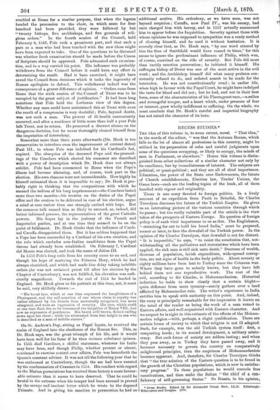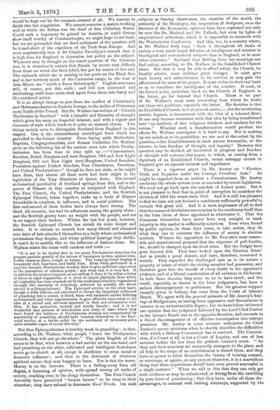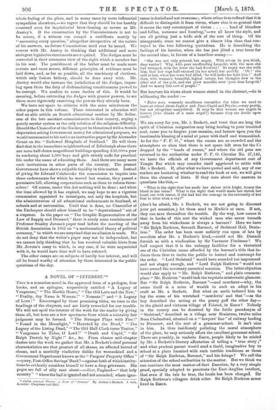RECESS STUDIES.*
THE idea of this volume is, to some extent, novel. "That idea," in the words of the editor, " was that the Autumn Recess, which falls to the lot of almost all professions in this country, might be utilized in the preparation of calm and careful judgments upon some of the questions occupying, or likely to occupy, the minds of men in Parliament, or elsewhere." Hence this volume is distin- guished from other collections of a similar character not only by its excellence, but by immediateness of interest. The subjects are political, or quasi-political ; and they are all of chief importance. Education, the power of the State over Endowments, the future of Church establishments, Election law, Trades' Unions, the Game laws—such are the leading topics of the book, all of them handled with vigour and originality.
There is one essay devoted to foreign politics. In a lively account of an expedition from Pesth to Brindisi, Sir Charles Trevelyan discusses the future of the Turkish Empire. He gives us an interesting picture of the various countries through which he passes ; but the really valuable part of the article is the view taken of the prospects of Eastern Europe. No question of foreign policy is of such vital importance to us as this. The Englishman,
stretching far out to hold his loved India," must be prepared, sooner or later, to face the downfall of the Turkish power. In the opinion of Sir Charles 'rrevelyan, that downfall is not far distant. "It is impossible," he says, " to resist the conclusion that, not- withstanding all the palliatives and restoratives which have been applied, the sick man is still sick unto death." Decrease of wealth, decrease of population, lavish expenditure, wide-spread corrup- tion, are not signs of health in the body politic. About seventy or eighty millions have been lent to Turkey since the Crimean war. Where they have gone to nobody knows, but they have left behind them not one reproductive work. The root of the evil, according to Sir Charles, is Mohammedanism. Historical induction he holds to show clearly that a certain blight— quite different from mere tyranny—surely gathers over a land afflicted by Mohammedan rule. The writer's experience in India entitles him to speak with authority on this point. And, indeed, the essay is principally remarkable for the impression it leaves on the mind of the reader as being the work of a man versed in Eastern affairs, and well acquainted with Eastern character. And we suspect he is right in this estimate of the effects of the Moham- medan religion—with, perhaps, a slight qualification. There are certain forms of society to which that religion is not ill adapted. Such, for example, was the old Turkish system itself : first, a conquering horde ; in its second development, a military aristo- cracy. But such forms of society are seldom lasting ; and when they pass away, as in Turkey they have passed away, and it becomes necessary to govern the country on comparatively enlightened principles, then the emptiness of Mohammedanism becomes apparent. And, therefore, Sir Charles Trevelyan thinks that "the true solution of the Eastern question is to be found in the growth of the Christian populations, which is now in satisfac- tory progress." To these populations he would concede free constitutions, and then make the Sultan "the chief of a con- federacy of self-governing States." So Russia, in his opinion, • Recess Studies. Edited by Sir Alexander Grant, Dart., LL.D. Edinburgh : Edmonston and Douglas. 1870.
would be kept out by the common consent of all. We venture to doubt this last suggestion. We cannot conceive a system working well in which the Sultan was the chief of free Christian States.
Could such a hegemony be gained by Austria, or could Greece show itself worthy of Constantinople, we might hope to see land;
but we are persuaded that no final settlement of the question will be found short of the expulsion of the Turk from Europe. And most emphatically true is Sir Charles Trevelyan's remark that it is high time for England to determine her policy on the subject. Whatever may be thought on the vexed question of the Crimean war, it is abundantly certain that Russia, by means very difficult from those on which she then relied, has got far nearer to her end.
The railroads which she is making to her ports on the Black Sea, and to her territory south of the Caucasian range, in the rear of Asia Minor, are "worth a dozen Sebastopols." English statesmen will, of course, put this aside ; and will rest contented and unthinking, until some crisis shall again force them into -hasty and ill-considered action.
It is an abrupt change to pass from the conflict of Christianity and Mohammedanism in Eastern Europe, to the strifes of Protestant sects North of the Tweed. But Dr. Wallace has written of "Church Tendencies in Scotland" with a breadth and liberality of thought which gives his essay an Imperial interest, and with a vigour and clearness of style which lends to it quite an unusual charm. Two things mainly seem to distinguish Scotland from England in this respect. One is the extraordinary centrifugal force which has prevailed in the former country. Even laying aside Methodists, Baptists, Congregationalists, and Roman Catholics, Dr. Wallace gives us the following list of the various sects into which Presby- terianism has from time to time split up :—" Cameronians, Seceders, Relief, Burghers and Anti-Burghers, Old and New Light Burghers, Old and New Light Anti-Burghers, United Seceder; Protesters against United Seceders, Free Churchmen, Erastiaus, and United Presbyterians ;" though he does not state, as he might have done, that almost all these sects had their origin in the legislation of the Tory Ministers of Queen Anne. The second ecclesiastical peculiarity of Scotland springs from this, and is the power of Dissent in that country as compared with England.
The Free Church, the United Presbyterians, and the Scottish Episcopal Church, taken together, make up a body of Dissent formidable in numbers, in influence, and in social position. The first and second of these bodies have always been strong. The third, till recently, has had its adherents among the gentry alone ; and the Scottish gentry have no weight with the people, and are in no respect their leaders. Within the last few years, however, the Scottish Episcopal Church has struck its roots deeper and wider. It is curious to remark how many liberal and educated men have of late attached themselves to a body whose ecclesiastical pretensions they despise, and whose political leanings they dislike. It won't do to ascribe this to the influence of fashion alone. Dr.
Wallace states the cause with candour and truth :-
"It is not to be denied that in too many Presbyterian churches the prayers partake greatly of the nature of harangues spoken against time, feeble, common-place, rough, or vulgar. The congregational singing is frequently dull, heartless, and badly done. Even when performed in a superior manner, Presbyterian worship fails to give sufficient expression to the conception of common prayer ; and when bad, it is very bad. If in addition the sermon happens, as not seldom it does, to be either a tissue of fierce or rigid dogmatism, or a piece of insipid platitude, from which all originality has been crushed out by the traditional timidity engendered through two centuries of orthodoxy enforced by penalty, the whole service is a disappointment. The Episcopal service, on the other hand, though a little tedious, and calculated to thrust the important ordinance of preaching into a corner, is fitted, when well rendered amidst befitting architectural and other appointments, to give effective expression to the idea of a united and reverent approach to God, and communion with Him. It has animation, variety, and stately beauty ; and it is not wonderful that persons of information and taste, in cases where they have found the baldness of Presbyterian worship not compensated by superiority of preaching, should have betaken themselves to the Epis- copal service, as a better outlet for the sentiment of reverence and a more suitable organ of social devotion."
But then Episcopalianism is terribly weak in preaching ; so that, according to Dr. Wallace, while people "leave the Presbyterian Church, they will not go elsewhere." The plain English of this seems to be that, what between a bad service on the one hand, and bad preaching on the other, cultivated and intelligent Scotchmen
never go to church at all, except in obedience to some social or domestic influence ; and then to the detriment of whatever spiritual nature they may happen to have. Nor is this the worst. Heresy is on the increase. There is a falling-away from old dogma, a loosening of opinion, wide-spread among all mike of society, reaching even to the clergy themselves. The Free Church Assembly have permitted "human hymns" to be sung in their churches ; they have refused to denounce Good Words. On such
subjects as Sunday observance, the creation of the world, the authority of the Decalogue, the inspiration of Scripture, even the doctrine of the Atonement, opinions have been expressed not only by men like Dr. Macleod and Dr. Tulloch, but even by lights of unquestioned orthodoxy, which it is impossible to reconcile with the Westminster Confession. And this, too, in a country where, as Dr. Wallace truly says, "there is throughout all ranks of society a very much larger diffusion of intelligence and interest in theological and ecclesiastical subjects than in England, or in most other countries." Scotland thus drifting from her moorings can find safety, according to Dr. Wallace, in the Established Church alone. But that it may be able to afford safety, the Church, he frankly admits, must undergo great changes, it must give such beauty and attractiveness to its services as may gain the affections of the mass of the people. It must widen its doctrinal basis so as to conciliate the intelligence of the country. It must, in the former point, assimilate itself to the Church of England : in
the latter, go far beyond that Church. There is no part of Dr. Wallace's essay more interesting than where he works out these two positions, especially the latter. His doctrine is that an Established Church, as it at present exists, i.e., for the inculcating certain dogmas, is inconsistent with the idea of a tolerant State. It can only become consistent with that idea by being transformed into "an institute of free religious thinkers and teachers for the nation." Whether such a transformation would produce the effects Dr. Wallace anticipates it is hard to say. But in making up our minds as to its possibility, we are met at the outset by the question,—Are Establishments in their nature favourable, or the reverse, to true freedom of thought and inquiry? However this question may be decided, all interested in progress and freedom of thought will welcome this paper, to which, as coming from a dignitary of an Established Church, recent unhappy events in England give an especial interest and importance.
There is a vigorous paper by Mr. Anstey on "Election Trials and Inquiries under the Corrupt Practices' Acts." As might be expected from so zealous a Commissioner, Mr. Anstey condemns the whole system even as amended by recent legislation. We need not go back upon the scandals of former years. But it is not pleasant to find that in point of corruption he considers the election of 1868 the worst since 1832. And it is still less pleasant to find we have not yet devised a machinery sufficiently powerful to restrain this great evil. And it is most unpleasant of all to find that the causes of this failure are even less in the machinery itself than in the false ideas of those appointed to administer it. That the Commons themselves have never been very straight to mark iniquity in this matter is sufficiently notorious. Even when forced by public opinion, in these later years, to take action, they do what they can to conserve the influence of money in election matters. Witness the opposition to Mr. Fawcett's most reason- able and constitutional proposal that the expenses of poll-booths, &c., should be charged upon the local rates. But the Judges have gone beyond this. They have looked upon the Election Trials' Act as purely a penal statute, and have, therefore, construed it strictly. They regarded the challenged seat as in its nature a property or estate of which the sitting member had possession, and therefore gave him the benefit of every doubt in his opponent's evidence, and of a liberal construction of all evidence in his favour. In both these theories they seem to us to have erred ; and the result, especially as shown in the later judgments, has been a serious discouragement to petitioners. But the greatest support recently given to bribery has come from the Court of Queen's Bench. We agree with the general estimate of Mr. Anstey's deal- ings at Bridgewater, as having been oppressive and discourteous in manner to an unwarrantable degree ; but we have before intimated our opinion that the judgment delivered by the Lord Chief Justice in the Queen's Bench errs in the opposite direction, and amounts to a direct discouragement of all effective investigation into corrupt practices. Mr. Anstey in some measure anticipates the Chief Justice's severe criticisms when he shortly describes the difficulties with which a Bribery Commission has to contend. The Commis- sion, if a Court at all, is but a Court of Inquiry, and one of less account before the law than the pettiest coroner's court. "As they and their secretary are necessarily strangers to the place, and all help in the shape of an establishment is denied them, and they have no power to allow themselves the luxury of hearing counsel, or attorneys, or agents, on any pretext whatever, it is a marvellous thing that those inquisitions should have even proved successful in a single instance." When we add to this that they can only get such evidence as may be volunteered, or wrung from the unwilling by pure force of questioning ; that they have, under all these dis- advantages, to contend with bribing attorneys, supported by the
whole feeling of the place, and in many cases by more influential sympathies elsewhere,—we regret that they should be too harshly censured even for inquisitorial brow-beating as severe as Mr. Anstey's. If the examination by the Commissioners is not to be severe, if a witness can compel a certificate merely by "answering every question," altogether irrespective of the nature of his answers, no future Commissions need ever be issued. We concur with Mr. Anstey in thinking that additional and more stringent legislative enactments are required. The Judges must be corrected in their erroneous view of the right which a member has in his seat. The punishment of the briber must be made more certain and more severe, different principles of evidence must be hid down, and, as far as possible, all the machinery of elections, which only fosters bribery, should be done away with. Mr. Anstey would also increase the jurisdiction of the Judges, impos- ing upon them the duty of disfranchising constituencies proved to be corrupt. We confess to some doubts of this. It would be assuring, before entrusting the Judges with greater powers, to see them more rigorously exercising the powers they already have.
We have not space to criticize with the same minuteness the other papers in this volume. Those interested in education will End an able article on Scotch educational matters by Mr. Seller, one of the late assistant-commissioners in that country, urging a purely secular system as the only solution of the religious difficulty. Should the Chancellor of the Exchequer be threatened with a Scotch deputation asking Government money for educational purposes, we would recommend to his notice an instructive paper by Sir Alexander Grant on the "Endowed Hospitals of Scotland." He will there end that in the immediate neighbourhood of Edinburgh alone there are some half-dozen magnificent buildings spending /50,000 a year in rendering about 1,000 boys and girls utterly unfit for practical iife under the name of educating them. And there are many more such institutions in other parts of the country. The present Government have shown culpable timidity in this matter. Instead of giving Sir Edward Colebrooke the commission to inquire into these endowments for which he moved last session, they passed a permissive bill, allowing corporations such as these to reform them- selves! Of course, under this Act nothing will be done ; and when the time allowed by it has expired, we may hope to see a vigorous commission appointed to investigate, not only the hospitals, but the administration of all educational endowments in Scotland, at schools and at universities. Until that is done, no Chancellor of the Exchequer should allow himself to be " deputationed " out of d sixpence. In the paper on "The Graphic Representation of the Law of Supply and Demand," there is surely some reminiscence of Professor Stanley Jevons's paper read before the meeting of the British Association in 1862 on "a mathematical theory of political economy," to which we are surprised that no allusion is made. We do not deny that the writer's paper may not be independent, but we cannot help thinking that he has received valuable hints from 1,1r. Jevons's essay to which, in any case, if he were acquainted with it, he would have done well to have referred.
The other essays are on subjects of hardly less interest, and will sill be found worthy of attention by those interested in the public questions of the day.




































 Previous page
Previous page